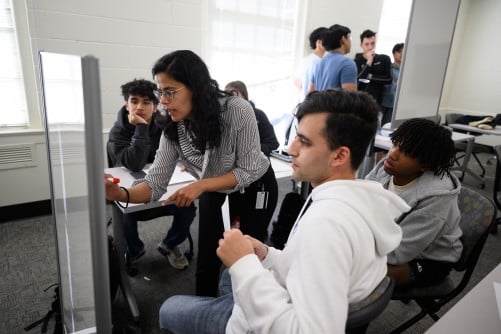Emerging technologies in artificial intelligence (AI) are set to transform critical sectors such as health care, disaster response, and power grid management. One promising area, multi-agent reinforcement learning (MARL), allows multiple AI systems to collaborate effectively. However, the risk of one system’s failure impacting others has limited its application outside gaming. With a grant of $598,609 from the National Science Foundation (NSF), Sarra Alqahtani, an associate professor of computer science at Wake Forest University, aims to enhance the safety and reliability of MARL systems over the next five years.
Alqahtani’s initiative focuses on developing standard algorithms and benchmarks that will ensure MARL-driven AI systems function correctly, even in the event of a failure or a cyberattack on one of the agents. By creating a framework that defines safety and security, she intends for these AI systems to not only achieve their goals but to do so safely. “We want them to not only collaborate to achieve certain tasks; we want them to collaborate to achieve those tasks safely,” Alqahtani stated.
Addressing Vulnerabilities in AI Systems
Alqahtani’s previous research has identified vulnerabilities within MARL systems, where hacking one AI agent could compromise the entire network. Her work employs reinforcement learning (RL), a method akin to teaching a child to ride a bike—explaining the process while allowing space for trial and error. In MARL, researchers set parameters and goals, rewarding AI agents for correct decisions until the desired outcome is achieved, irrespective of an individual agent’s failure.
Originally from a small village in Saudi Arabia, Alqahtani pursued computer science at university due to its challenging nature. She began her journey into MARL during her post-doctoral fellowship at the University of Tulsa. The NSF CAREER grants are awarded to junior faculty who excel as teacher-scholars, emphasizing research and education. At Wake Forest, she has introduced a unique curriculum on reinforcement learning for both graduate and undergraduate students.
The NSF grant will allow Alqahtani to develop a hands-on undergraduate course centered on AI security and safety, along with a new graduate course focused on the safety of reinforcement learning. She is dedicated to the teacher-scholar model at Wake Forest and prioritizes mentoring, encouraging her students to engage deeply with their research. “I tell them, ‘You’re going to be beyond just collecting results and generating graphs. You are going to come up with problems, and you are going to solve them and write papers, too,’” Alqahtani remarked. Her belief in student potential has led to significant achievements; four undergraduates have received the prestigious Goldwater scholarship and NSF Graduate Research Fellowship Program awards.
Real-World Applications and Collaborations
The NSF CAREER award also supports the addition of a post-doctoral scholar in computer science at Wake Forest. Alqahtani plans to take her research beyond the classroom by working with students in the Amazon forests of Peru. This fieldwork will test her MARL safety algorithms in collaboration with the Center for Amazonian Scientific Innovation (CINCIA). This initiative seeks to address the harmful impacts of illegal artisanal gold mining on local ecosystems and communities.
Using MARL, Alqahtani’s research aims to guide a fleet of drones to identify illegal mining sites, enabling law enforcement to take appropriate action. The MARL framework will ensure that the drone fleet remains operational, even if one drone becomes nonfunctional. She expressed enthusiasm for applying her research to real-world challenges, stating, “I want to be able to equip the drones with the ability to recognize unsafe or dangerous areas and avoid them. I’m excited to take my work outside the lab.”
Through this innovative project, Alqahtani is not only advancing the field of AI but is also fostering international collaboration with the Universidad Nacional Amazónica de Madre de Dios. She plans to conduct workshops for CINCIA employees in March 2027 and March 2029, further solidifying the partnership between Wake Forest students and local researchers.
In summary, Sarra Alqahtani’s NSF-funded research promises to address critical safety concerns in AI applications, with far-reaching implications for health care, environmental monitoring, and disaster response. As this field evolves, her work may pave the way for safer, more robust multi-agent systems that enhance human well-being.
